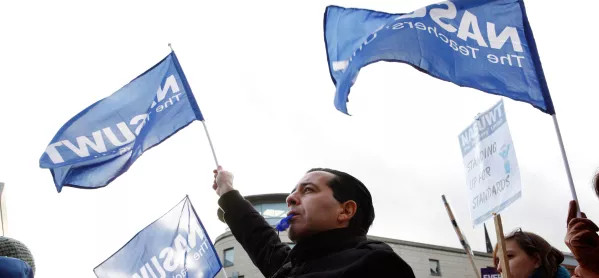Teaching unions move closer to strike action as ballots announced

The government is facing the increasing likelihood of strike action from two major teaching unions, after both made important ballot announcements today.
The NASUWT teaching union said it would ballot its members for industrial action over pay, while the NEU revealed that the results of a preliminary ballot showed the vast majority of its teacher members were willing to take strike action to demand a fully funded, above-inflation pay rise.
The NEU, England’s biggest teacher union, said that it would announce a timetable for a ballot in the coming week.
- Teacher pay: Half of school leaders back union strike action vote
- Background: Heads’ union asks members whether to ballot for strike
- NEU: Union sets September date for first teacher strike ballot
The NASUWT is recommending that members vote in favour of strikes and other forms of industrial action.
It said ministers had failed to engage in negotiations with it over teacher pay, despite repeated calls to do so.
Ballot papers will be issued to members in England and Wales from 27 October and the ballot will close on 9 January.
The threat of teacher strikes over pay
The NEU said that when surveyed on whether they were willing to take strike action to demand a fully funded, above-inflation pay rise, as part of a future formal ballot, 86 per cent of teacher members said “yes”.
It said a separate preliminary ballot of support staff also strongly supported taking action over pay.
The union had given the government until today to respond to a letter calling on it to prevent a formal trade dispute, and said it had received no answer.
It said it would announce a timetable for a formal ballot and potential dates of strike action in the coming week.
NASUWT general secretary Patrick Roach said: “The NASUWT has done everything possible to seek a resolution to this dispute and to avoid escalation of industrial action in schools and colleges.
“The government has failed to recognise the damaging impact of years of real-terms pay cuts on the morale of teachers and which is fuelling the teacher recruitment and retention crisis.
“Ministers will be entirely responsible for industrial action unless they act immediately to deliver a better pay deal for teachers.”
Dr Mary Bousted and Kevin Courtney, joint general secretaries of the NEU, said the preliminary ballot result was “a clear statement from teachers that they cannot go on like this”.
In a joint statement, they added: “Our members don’t want to strike - they want to be in the classroom, doing what they do best, educating the nation’s children.
“It is regrettable that we have reached this point, but enough is enough. A yes vote will be our recommendation in the ballot, and we will use that mandate to demand from government a serious answer to more than a decade of declining pay. It is time not only to value education but to value educators.”
The NAHT school leaders’ union also recently launched a consultation with its members over their views on pay and funding, while the NASUWT has said it is “committed” to balloting its members on industrial action in the autumn term if an improved pay deal is not offered.
And earlier this month the Association of School and College Leaders released the results of its survey of school leaders, which asked whether the union should run an indicative ballot for action short of strike action and an indicative ballot on strike action.
Half of the school leaders surveyed said the union should run an indicative ballot on strike action, but half of respondents said the union should not take this step.
The school standards minister warned at the Conservative Party Conference last week that the government will “not budge” on this year’s pay offer for teachers.
The NEU will also launch a strike ballot next week for sixth-form college members after they showed overwhelming support for demanding an above-inflation pay rise.
You need a Tes subscription to read this article
Subscribe now to read this article and get other subscriber-only content:
- Unlimited access to all Tes magazine content
- Exclusive subscriber-only stories
- Award-winning email newsletters
Already a subscriber? Log in
You need a subscription to read this article
Subscribe now to read this article and get other subscriber-only content, including:
- Unlimited access to all Tes magazine content
- Exclusive subscriber-only stories
- Award-winning email newsletters
topics in this article



